| |
|
OPEN
TO QUESTION
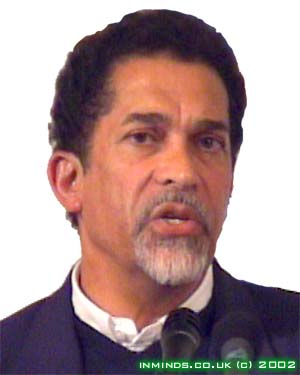
Imam Achmad Cassiem
VETERAN
OF THE STRUGGLE AGAINST APARTHEID
CHAIRPERSON OF ISLAMIC UNITY CONVENTION
Imam Achmad
Cassiem is the National Chairperson of the Islamic Unity Convention
(South Africa). At aged 15 he joined the armed struggle against
the oppressive apartheid regime in South Africa and at the age
of 17 he was one of the youngest people to be imprisoned on
Robben Island. Imam Achmad Cassiem is also an advisor to the
Islamic Human Rights Commission, we caught up with him at a
recent IHRC conference.
Interviewed on 24th
February 2002
"... You
cant go through primary school and secondary school without
being influenced by political discussions in the class
rooms. You read South African literature and there is
reference to 'Bass' which means boss or the oppressive
ruler and teachers will draw your attention to that, or
words that were used to insult the Africans, the word
'Kaffa' and the teachers will tell us please delete that
word and put the word man in there instead of referring
to humans in the derogatory sense. All of that obviously
helped us cope with this indoctrination which was in place
of so called education...
I was fortunate
enough to have grown up in an Islamic environment where
the principles of truth, honesty and sincerity were the
most important principles ...
The Africans,
what are called the black indigenous Africans were carrying
passes where as the so-called coloureds and indians and
whites did not carry passes - so this was a badge of slavery.
So
when the Pan-Africanist Congress[PAC] called for an anti-pass
campaign in 1960...
the Africans came ... and marched on to the city, and
a friend and I [aged 14] were standing on the main road
observing this scene and all of a sudden we said to each
other 'This is our march' - because we are opposed to
this entire system, so although we were not pass carriers
and our parents were not, we joined this anti-pass campaign,
we had not been recruited, we were not signed up members
but as a show of solidarity..."
|
"... South
Africans had fought in the war against Nazism, and one
of the stories told by our uncles and people who had fought
in the war was when they asked their colonial masters
- the British in this case who had control of South Africa
since 1804 - 'Why is it that you are opposed to Hitler?'
The colonialist replied 'Hitler wants to control the whole
of Europe including Britian' So they said 'Whats wrong
with that?' The reason for that question was that Britain
was controlling South Africa, and Rhodesia and Botswana
and Swaziland and Musutu...
The reply the
colonial masters gave the soldiers gave was 'Germany for
the Germans and England for the English' and then the
question of course cropped up 'Why not Africa for the
Africans?'.
So if they were
sacrificing their lives to protect their colonial masters
why shouldn't they sacrifice their lives in order to protect
themselves and their own country? And that became an important
argument from the soldiers who came back from the second
world war..."
|
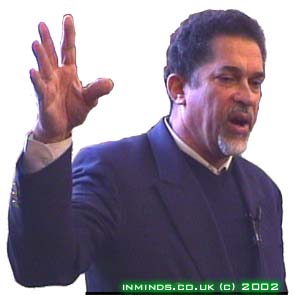 |
"it is immoral,
irrational, it is obscene for an oppressor to tell the oppressed
how they should respond to oppression" |
|
Q3:
You served a total of 11 years imprisoned on Robben Island.
Can you tell us something about this period, what were the
conditions like, and what effect those years of imprisonment
had on you?
|

[23:08min] |
|
|
|
Download
Answer (shift-click) (2.8Mb) |
"...
I was 17 years old when I was arrested together with my
school teacher, Sadiq Isaacs
who was the maths and science teacher - he was the one
who had the knowledge about bomb calimitory and manufacturing
of explosives, and he was in charge of the explosives
laboratory we had set up..
I
was sentenced to 5 years hard labour, Sadiq Isaacs was
seen as the mastermind - he received 12 years... When
we arrived on Robben Island we discovered there were already
1800 prisoners on the island...
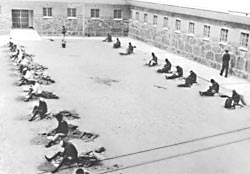
Prisoners breaking stone at the
Robben Island B-Section courtyard
Life
on Devils Island:
"Robben
Island was called Devils Island for a particular reason
- because it was one of the worst prisons in the world.
The
psychological tortures are numerous. The humiliation -
stripping prisoners naked daily, they were strip searched,
sometimes they were even 'felt up' with rubber gloves.
this was just one of the many forms of humiliation that
the prisoners suffered.
Then
of course psychological tortures of the nature where Johnson
Molumbo, who eventually became vice-president in the PAC
[Pan African Congress], he was serving a 20 year sentence
and on a very hot summers day he asked for water so they
buried him on the beach front up to his neck in the sand
and then urinated in to his mouth...
Then
regards physical torture - compulsory hard labour was
a form of physical torture -if you did not perform and
do sufficient work they would punish you including corporal
punishment but most times they would cut your meals until
you produce satisfactorily.
I
was one of the victims of corporal punishment for trying
to expose conditions in prison by trying to smuggle out
letters to Amnesty International as well as the International
Red Cross .. unfortunately the warder who was to take
the letters off the island to our contacts was a double
agent and he handed all the correspondence to the security
police. So we were stripped naked and tied to a contraction
that looks like a horse at an incline, then they tie your
wrists and ankles and they put a cushion on your kidneys
and on your thighs, then they whip you. The flesh splits
open, this is in front of the entire prison staff including
the district surgeon of the area, and when the flesh splits
open and they are finished delivering the six cuts then
they pour iodine in to the wound on the pretext that it
prevents infection. Then you get dressed and immediately
go back to work in that condition...
Other
prisoners who received corporal punishment included Johnson
Molumbo for spilling
a cup of minimum drink on a wardens uniform when the warden
pulled him... So you can see the arbitrary treatment in
trying to break prisoners resistance and to humiliate
them.
Solitary
confinement is one of the worst tortures that you can
impose on a human being - solitary confinement does not
lead to torture - it IS torture because there is sensory
depravation, humiliation, you suffer from hallucinations,
etc.
The
other torture was of course the fact that you were imprisoned
on an island and you only received one visitor every six
months and that visit was for half an hour, it was monitored
and you were not allowed to discuss anything except family
matters. You were only allowed to write one letter every
six months and that was censored, and you were allowed
to receive only one letter every six months. So you can
imagine the sense of isolation and literally the destruction
of the bonding of the family which was part of the psychological
torture.
You
asked me what effect this had on my life, I can only say
that because I was so young it tempered me like fire tempers
steel and made me more determined that the apartheid regime
must be destroyed."
|
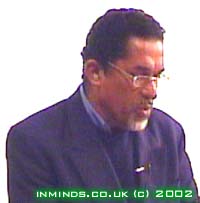 |
"Unjust laws
cannot be Justly applied - whether in South Africa or anywhere
else in the world"
|
Banning
Orders:
"Banning
orders are terrible things - it prohibits you from being
quoted, from working in a factory, working in an office
with more than five workers, you are house arrested from
6pm in the evening to 6am in the morning and on the weekends
and public holidays you are house arrested for 24 hours
a day, you had to sign at the local police station at
least once a week between specific times, you could not
teach anybody except your own children, I was unmarried
and didn't have children so the only person I could teach
was myself, you could not speak to more than one person
even outside your home because that would constitute a
social gathering, and you were not allowed to receive
any visitors at your home, you were not allowed to enter
any educational institute - private or public, your mail
was monitored, your telephone conversations were intercepted
- now that means total control of you - this basically
is what the government did at the time. I was unfortunate
enough to have been banned continuously for 11 years and
I was one of the last people to remain banned.
I
was arrested for breaking my banning order because I had
attended Jummah [Friday congregational prayers] which
is a social gathering...
...
In 1980 whilst under the banning order I was arrested
for insighting opposition to racist education in South
Africa - obviously I couldn't remain idle whilst being
banned and I was unemployed so I had lots of time on my
hands to organise teachers and students. I was held in
detention at prison together with 65 others in single
cells, and I was held for 243 days without being charged.
On one occasion I was punished for speaking to prisoners
who had been brought down from the Transvaal. The commanding
officer of the prison had asked us not to speak to them,
not even to greet them. My Islamic principles said that
if I'm not allowed to greet a fellow oppressed person
then I should not be greeting the oppressor which I'd
done up to that time. As a form of punishment they confiscated
all our newspapers and books including the Qur'ans we
had...
...
freedom didn't last very long - on the 2nd of May 1981
I was arrested under the terrorism act because ten of
our guerrillas had been intercepted at Athens airport
on their way from Libya, where they had received training,
on their way to Harare in order to infiltrate South Africa
from there. Unfortunately one of the guerrillas belonging
to the PAC[Pan African Congress] had my telephone number
on him and when he was caught they traced that telephone
number to me and I was taken in to detention again. The
trial started mid 1987, and we were only sentenced Oct
1988 - so we had already been in detention for almost
two and a half years. It was then that the six year sentence
[back to Robben Island] was imposed - I was sentenced
strictly on the basis of Quranic ayas because the Quran
was seen as being a subversive document..."
|
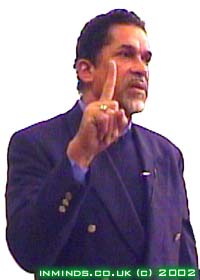 |
"We may not
become adjusted to maladjustment - this is what psychologists
and psychiatrists are trying to do, instead of changing
the social order they want to change the individuals adjustment
to the unjust order - there is no mass psychotherapy - we
must deal with the question of oppression, exploitation
and injustice at the level where it must be dealt with"
|
|
Q4:
During the long struggle against apartheid there must have
been some low points when victory seemed unattainable, what
kept you going?
|

[4:26min] |
|
|
|
Download
Answer (shift-click) (546Kb) |
"Fortunately
I did not believe in the slogan 'freedom in our life time'
and that was on purely rational grounds because nobody
in the world knows how long a life time is - some children
are born dead, others die a few days after they are born,
some people live till they are 124 years... so 'freedom
in our life time' did not attract me as a slogan. I only
knew that on the bases of my Islamic principles I had
rights which Allah has ordained for us and He had also
ordained obligations, and that was the perfect balance
- that whilst we carried out our obligations the struggle
continues and we hand over this baton to the next generation
and that is all that I was concerned with at the time.
Of
course there were times when you felt disappointed especially
when the revolution is capitulated or oppressed people
started compromising with the oppressor - that did not
interest us because we believed for us it was all or nothing
- it didn't makes sense to make maximum sacrifices for
minimum gains...
I
would advise that to any oppressed people - Don't make
maximum sacrifices for minimum gains - if you are going
to make maximum sacrifices demand maximum gains - our
maximum demand was for a just social order - something
which we have still not achieved..."
|
"I
think the lowest point is to see
a prisoner die next to you in a prison cell, because he
is there for a cause. He might not even have a visit during
his entire term of imprisonment because his family stays
up in the Transvaal - more than a 1000 km away and are
too poor. He had contributed his maximum to the struggle
and he dies and they don't even remember him afterwards
- I think that was the low watermark."
|
|
Q6:
How did your society react to your participation in the
struggle, both before your arrest, during your imprisonment
and after your release?
|

[5:26min] |
|
|
|
Download
Answer (shift-click) (668Kb) |
"Our
biggest disappointment was that many of the ulema did
not take active steps to combat apartheid... many of them
openly collaborated with apartheid in exchange for favours
- but that was to be expected because the British had
used this tactic all over the world ... Sudan, Egypt,
Malaysia... and we were no exception.
...
the leadership in the community left much to be desired.
Because if you are going to form part of the leadership
in any community, but especially in the Muslim community,
there are three characteristics which are absolutely necessary:
1.
You must be sincere - you must be the most sincere of
us if you are to lead us.
2.
You must be knowledgeable about what you stand for, your
principles, your values, your ideals and especially your
methods of struggle.
3.
You must be utterly and totally fearless. When we recite
the ayahs in Quran like 'Fear not for Allah is with us'
- Muslims sloganize some of these but they don't understand
what must be done with it. 'We
fear no one except Allah'
which is the slogan most Muslims know, but that has to
be practiced in real life so when the enemy knows that
you don't fear death then the enemy fears you..."
|
"...the
Muslim community was completely traumatised
by the killing of Shaheed Imam Abdullah Haroon, and they
became more fearful because if they could kill the leader
in your community what chance did the ordinary persons
have. This had exactly the opposite effect on me - we
believe that the tree of freedom is nourished by the blood
of martyrs and that became the inspiration...
When
I was banned many Muslims didn't even want to greet me
for fear of being contaminated ... but others on the other
hand made it their point to send messages of support and
support us financially..."
|
"The
greatest influence in my life is definitely Islam - the
Quran itself... and here my father, my aunts and my mother...
the works of al Shaheeds Syed Qutb, Imam Hasan-al Bana,
and the last great influence of my life was that of Imam
Khomeini - I had to listen to him and I had to respect
him because this was a revolutionary who had succeeded
where as the others had attempted revolutions, so being
the founder of the Islamic Republic of Iran and being
the leader of this great revolutionary force everything
he has to say must be treated with respect and everything
he has said fortunately is based strictly on Quranic principles
- even in a press interview you could go back to the Quran
and extract the principles he based his reply on!"
|
Similarities
between apartheid & the zionist regime:
"...
we know that they were both established in 1948, and a
Spanish socialist revolutionary in a work which has not
yet been translated in to english actually says that the
zionist regime in could not be established before the
Jews got hold of the economy in South Africa - now thats
a very interesting observation.
We
also know that the first foreign head of government to
visit the zionist state of israel was Dr D.F.Malan - the
first apartheid Prime Minister, so here are two indications
of what is happening.
Thirdly
the israeli air force was established by a pilot from
South Africa. Uri Oren, a former ambassador from israel
to South Africa had boasted on the 50th anniversary of
the state of israel that 28% of the soldiers that fought
for the establishment of israel came from South Africa
- that's almost a third of the forces, now obviously this
indicates the cooperation.
In
a book called 'The Unnatural Alliance' written by James
Adams he tabulates the particular relationships between
the apartheid regime and the zionist regime including
nuclear co-operation, etc.
So
my observation is that
1.
Both the zionist regime and the apartheid regime were
racist based on statutory racism - they use the police,
the courts of law, the judiciary and the army to impose
racism on its inhabitants,
2. Both
are chauvinistic - they believe that they are above all
others, they are the superior group
3. Both
are expansionist in their political concepts - they wanted
to conquer the surrounding territories...
4. Both
are colonialist entities - these are not indigenous people
who are controlling the territories and the government
5. Both
are imperialist outposts and up to this date they remain
imperialist outposts - South Africa as well as israel,
because they are implementing the policies of the super
powers...
But my
submission is that the zionist regime is worse than the
apartheid regime because the zionist regime claims that
Jews are superior on the basis of Biblical scripture and
they claim the land of Palestine on the basis of scripture
- that makes it a more serious issue...
At
the moment people are trying to buy in to this idea that
israel is an apartheid state... I think we must avoid
saying that because I know what the intention is, if we
accept that idea then it means that israel - the zionists
and the Palestinians can resolve their differences like
the differences in South Africa were resolved - through
talks and reconciliation... we have been short changed
in South Africa because the revolution was aborted...
I would advise the Palestinian people please understand
if you make maximum sacrifices - make maximum demands."
|
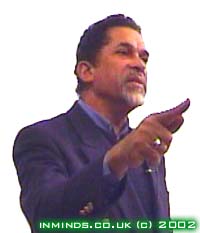 |
"My advise
to any oppressed people -
Don't make Maximum Sacrifices
for Minimum Gains - if you are going to make Maximum Sacrifices
demand Maximum Gains!"
|
|
Q10:
As a front-line veteran of the war against apartheid in
South Africa can you advice those who are not on the front-line
in the war against Israeli oppression, as to how they can
best support those who are on the front-line?
|

[4:08min] |
|
|
|
Download
Answer (shift-click) (509Kb) |
On
Unity:
"You must have the unity of the oppressed people,
because if they are disunited they are going to be disseminated
and massacred, and we have already seen this taking place
all over the world. But if you are united - not on the
basis of emotionalism, not on the basis of a cult, not
on the basis of a personality, but if you are united on
the basis of your ideology which means on the basis of
principles so that you have a principled unity no body
can destroy you and if the leadership that emerges from
that principles unity is sincere and fearless then you
have a revolutionary force that must be reckoned with."
Methods of struggle:
"...
Armed struggle is of course essential because in the Quran
armed resistance, armed struggle is ordained by Allah
- the first time armed struggle is made permissible for
Muslims is in Surah Hajj -surah 22 ayat 39, Allah says
'permission is given to you to fight because you have
been wronged' - that principle essentially means that
the only people in the world who have the sole justification
for resorting to armed struggle, to violence, to force
are the oppressed people - nobody else has that right
or justification.
But
more importantly it is immoral, irrational, it is obscene
for an oppressor to tell the oppressed how they should
respond to oppression, so if there are two principles
that we should teach all oppressed people then it is those
two principles"
|
|
Q11:
You come from a country with a very small minority Muslim
population, and yet you have helped shape that country's
future. In the west the Muslims are a minority in every
country, What advise do you have for them?
|

[4:22min] |
|
|
|
Download
Answer (shift-click) (538Kb) |
"...
it has always been an argument in South Africa by those
who did not have the guts for armed struggle and to resist
the oppressive regime to say 'we are only a minority,
what can we do?' - now that is capitulation. So we say
that this message [Al-Quran] is revealed to al-Nas the
whole of mankind. Mahatma Gandhi has this potent saying
that 'if one person is in possession of the truth, he
or she will always be a majority of one' - Muslims must
not think of themselves as a minority.
Our
methods of struggle for those who live as numerical minorities
in any part of the world is very simple, the Quran says
'use the best of arguments and set the best of examples'
..."
|
On
Leadership:
"My
experience tells me that first and foremost the leadership
must be sincere. There must be a leadership and not merely
leaders because when you chop of the head of a leader
the movement collapses, when you have a leadership they
at least consolidate and continue the struggle. They must
have ideological clarity which first and foremost means
that they must have conceptual clarity and I find that
it is conceptual illiteracy that that is a great problem
in the general community but conceptual confusion and
conceptual illiteracy
at the level of the leadership is unforgivable - they
must know what they are talking about and they must commit
themselves. So they must make themselves aware conceptually,
they must choose a direction and they must commit themselves
to that direction so that we can actually deliver what
needs to be delivered on the basis of that unity, that
leadership and that sincerity and that fearlessness."
© Innovative
Minds
URL:
http://www.inminds.co.uk/qa-imam-achmad-cassiem.html
|
Back
to OPEN TO QUESTION Home
|
|






